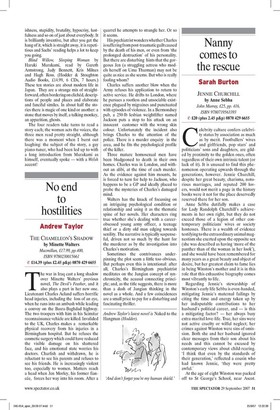No end to hostilities
Andrew Taylor THE CHAMELEON'S SHADOW by Minette Walters Macmillan, £17.99, pp.400, ISBN 9780230015661 © £1439 (plus £2.45 p&p) 0870 429 6655 The war in Iraq cast a long shadow over Minette Walters' previous novel, The Devil's Feather, and it also plays a part in her new one. Lieutenant Charles Acland suffers horrific head injuries, including the loss of an eye, when he runs into an ambush while leading a convoy on the Basra-Baghdad highway. The two troopers with him in his Scimitar reconnaissance vehicle are killed. Invalided to the UK, Charles makes a remarkable physical recovery from his injuries in a Birmingham hospital. But he refuses the cosmetic surgery which could have reduced the visible damage on his shattered face, and his emotional state worries his doctors. Churlish and withdrawn, he is reluctant to see his parents and refuses to see his friends. He is increasingly violent too, especially to women. Matters reach a head when Jen Morley, his former fiancée, forces her way into his room. After a quarrel he attempts to strangle her. Or so it seems.
His psychiatrist wonders whether Charles is suffering from post-traumatic guilt caused by the death of his men, or even from 'the prolonged destruction' of his personality. But there are disturbing hints that the gorgeous Jen (a struggling actress who models herself on Uma Thurman) may not be quite as nice as she seems. But who is really fooling whom?
Charles suffers another blow when the Army refuses his application to return to active service. He drifts to London, where he pursues a rootless and unsociable existence plagued by migraines and punctuated with episodes of violence. In a Bermondsey pub, a 250-lb lesbian weightlifter named Jackson puts a stop to his attack on an innocent customer with the wrong skin colour. Unfortunately the incident also brings Charles to the attention of the police. There is a murder enquiry in the area, and he fits the psychological profile of the killer.
Three mature homosexual men have been bludgeoned to death in their own homes. Charles was in London, and without an alibi, at the time of each murder. As the evidence against him mounts, he is forced to turn for help to Jackson, who happens to be a GP and ideally placed to probe the mysteries of Charles's damaged mind.
Walters has the knack of focussing on an intriguing psychological condition or relationship and using it as the thematic spine of her novels. Her characters ring true whether she's dealing with a careerobsessed young army officer, a teenage thief or a dirty old man edging towards senility. The narrative is typically suspenseful, driven not so much by the hunt for the murderer as by the investigation into Charles's motivation.
Sometimes the contrivances underpinning the plot seem a little too obvious. But perhaps even this is intentional: after all, Charles's Birmingham psychiatrist meditates on the Jungian concept of synchronicity, the acausal connecting principle; and, as the title suggests, there is more than a dash of Jungian thinking in the novel as a whole. And a few coincidences are a small price to pay for a disturbing and fascinating thriller.
Andrew Taylor's latest novel is Naked to the Hangman (Hodder).























































 Previous page
Previous page